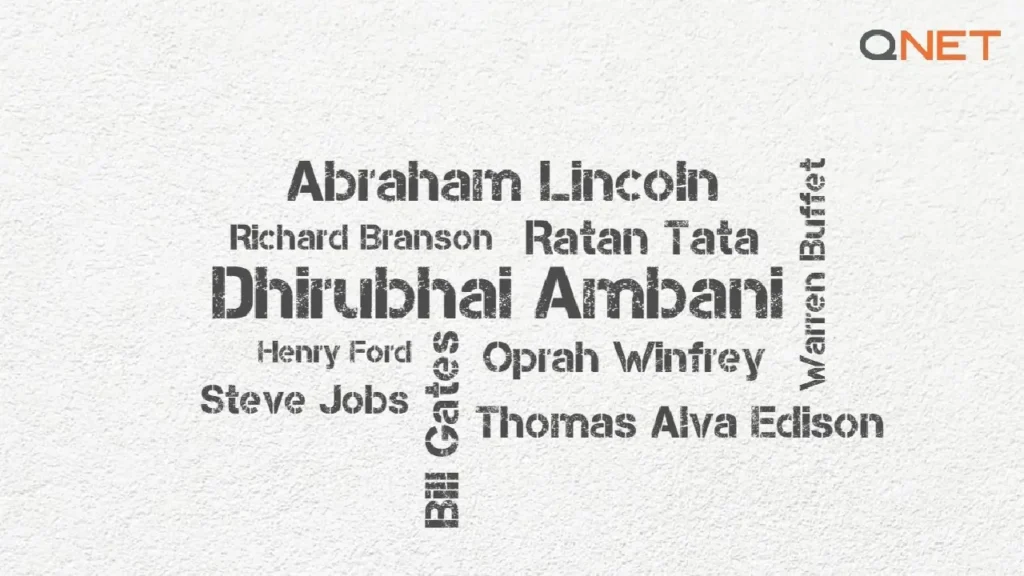According to Peter Drucker, “The best way to predict the future is to create it.” In a way, the Father of Modern Management was summing up the entrepreneurial mindset. We have seen countless examples of it in enterprising individuals like Thomas Alva Edison, Richard Branson, Warren Buffet, Oprah Winfrey, Ratan Tata, Dhirubhai Ambani, Steve Jobs, and Bill Gates to name a few.
Both in India and globally, the appeal of Direct Selling is finding a wider reception among individuals with entrepreneurial aspirations. Notably, the journey to consistent success of the kind achieved by these legends is certainly not straightforward. This article also highlights how direct sellers can succeed in the modern dynamic market.
Read More: Direct Selling Success in an Ever-Changing Market
The world’s best-known entrepreneurs, past and present, have made success a habit in their own unique ways. And those who want to carve out a thriving career in this space will benefit by taking a leaf or two from their playbooks.
We present an interesting mix of global and Indian leaders in the entrepreneurial space with five distinctive insights from their extraordinary journeys for budding direct sellers.

Making an emotional connection with the customer is crucial
“Touch your customer, and you’re halfway there,” said Estée Lauder who laid the foundation stones of the cosmetics industry in New York in the 1940s.
Born to Jewish immigrants of Hungarian origin and growing to be one of the most influential women entrepreneurs in the world, Estee Lauder is known for placing a great deal of emphasis on hard work, persistence, and risk-taking. However, this particular quote by the late American entrepreneur speaks volumes of the importance she gave to establishing an emotional connection with the customer’s world. QNET always tries to connect with customers worldwide by providing a solid entrepreneurial opportunity backed with credible products.
Success doesn’t come overnight; so persist with patience
“If you really look closely, most overnight successes took a long time.” When Steve Jobs said these words, he was reinforcing two necessary traits that an entrepreneur must practise and perfect – patience and persistence.
Most of the time, fledgling entrepreneurs falter because they expect instant success and end up feeling frustrated, disappointed, and possibly deflated when their ventures do not take off as quickly or in the direction expected. This applies to direct selling too.
The important takeaway here is that if they actually wait it out and refuse to give up on their dreams and goals despite initial hiccups and setbacks at various stages, they are bound to see the results coming through in the long term.
Read More: What is the Hallmark of a Successful Entrepreneur?
Opportunities don’t always come knocking. Openness to ideas and learning continuously will open new doors
“Most people get ahead during the time that others waste,” according to Henry Ford.
Many entrepreneurs who had humble beginnings, went on to become path-finders and wealth-creators on the global stage. These include famous names like Ray Kroc who was a milkshake mixer salesman before he became the man behind MacDonald’s brand popularity. Likewise, Kiran Mazumdar-Shaw initially operated out of a shed she rented where she went on to plant the seeds of the global biopharmaceutical company, Biocon.
These are examples of highly driven individuals who didn’t wait for opportunity to fall into their lap but created it with courage, originality, and purposefulness. Also, it emphasises the importance of always being in work mode, whether one is selling an idea or a product. You need to understand a market and business if you want to thrive in the industry.
Be tuned into what to learn from failure
Henry Ford also firmly believed that “The only real mistake is the one from which we learn nothing.”, whereas Bill Gates provides a cautionary note in saying, “It’s fine to celebrate success but more important to heed the lessons of failure.”
Any experienced entrepreneur will tell newbies that flops and disappointments are inevitable and how it is best to take a pause to introspect and course-correct at such junctures. They will also talk about how a challenge can be turned into a business opportunity if one is properly tuned into the lessons offered by the failure.

Passion all the way to create one’s own market niche
If there is one trait that unifies the greatest of entrepreneurs across time, it is the passion that drives their business vision and makes them path-finders in the true sense.
As Ratan Tata said, “Your attitude, not your aptitude, will determine your altitude.” Although he hails from one of the most affluent business families in India, he started on the shop floor of Tata Steel and eventually became its chairman hugely respected for his boldness, and strategy of preparing the group to become more competitive before going global. At the same time, he is known for his uncompromising stance on ethics and values.
Dhirubhai Ambani, who believed that Indians had the potential to compete with the world’s best, was another great pioneer and visionary. His famous words, “I’ve been excavating the jungle and making the road for others to walk,” will resonate with and encourage entrepreneurs and direct sellers aspiring to create their own path in the market.
As Abraham Lincoln, “Whatever you are, be a good one.” If your chosen path is of direct selling, these insights should help you take confident strides on your journey to becoming extraordinary at what you do.
As a leading direct selling platform, QNET encourages and nurtures the entrepreneurial spirit by enabling access to a wider network of contacts, which is another essential for success in this choice of business. Moreover, the QNET direct selling opportunity is an avenue that welcomes entrepreneurs on board with a diverse range of products that are of superlative quality while setting them on a path of growth in the long term.
FAQs
Why should one look at Direct Selling as a business opportunity compared to becoming a seller as per the traditional business model?
The biggest advantage of Direct Selling is the absence of an intermediary – as a direct seller, you directly engage and transact with your buyers. Plus, there is cost-effectiveness – you don’t need to find shelf space in a brick-and-mortar outlet or invest in a physical space such as a mall outlet. You can do it end-to-end from the comfort of your home.
There is a lower initial cost to kick-start compared to the traditional retail model. Particularly in a country like India where micro and small business enterprises have a huge presence, it can be quite challenging for an individual to take off on their own amid intense competition and start earning profitably.
How would one go about becoming a direct seller on the QNET platform?
A platform like QNET is made for those seeking direct selling opportunities and welcomes people across different walks of life with the right entrepreneurial mindset and attitude.
Anyone who is 21 years of age or older, can sign up to become a registered distributor on the QNET India website. Registration as a QNET Distributor in India is completely free.
Note that you will not be joining the company as an employee. Before you take the step to register, arming yourself with the right information is important. We request you to read through the policies and procedures of the business and peruse all the detailed information provided publicly on QNET India’s website before you decide.
Why does QNET have a zero-tolerance policy in terms of ethical code violations?
QNET places a paramount emphasis on maintaining the highest ethical standards within its business operations. While it is necessary for a business to be profitable, it must be achieved through completely ethical and transparent means. It goes a long way in maintaining customer trust, which is vital, particularly in the direct selling business.
QNET expects its direct sellers to uphold a set of core values. These values include delivering products and services of the utmost quality, operating with transparency in line with company policies, and adhering to a strict ethical code.
QNET’s dedicated Network Integrity Department (NID), oversees and monitors the behaviour of our distributor network to ensure compliance with the company’s policies and ethical guidelines. If a distributor is found violating the QNET ethics and cannot defend themselves adequately, it could result in the suspension or termination of the distributor.








